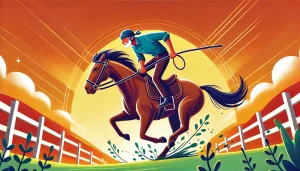When life knocks you down, will you stay on the ground or rise again?
To resume an activity or try again after experiencing failure, setback, or disappointment.
Learning idiomatic expressions can feel like entering a new realm of language.
“Get back on the horse” has nothing to do with actual horses in modern contexts—it’s about recovering from failure with renewed determination.
This powerful idiom encourages resilience when facing obstacles, whether in your career, personal goals, or everyday challenges.
By understanding its origins and applications, you’ll be able to use it confidently in various situations, adding color and depth to your English conversations.
What to Expect in This Blog
- Meaning of the Idiom: We’ll break down what get back on the horse really implies.
- Origins and Historical Context: Discover how this phrase evolved and why it remains relevant.
- Practical Applications: Learn where and when you can use this idiom in professional and personal settings.
- Personal Anecdotes and Tips: Gain insights into how others have applied get back on the horse to overcome challenges.
- Key Takeaways: Summarize your newfound understanding and walk away with actionable advice.
The Significance of “Get Back on the Horse”
Idiomatic expressions like get back on the horse add color and depth to any language. They serve as cultural markers that reflect common experiences, values, and historical contexts.
This particular idiom encapsulates the spirit of resilience, urging anyone who has experienced a setback to try again. It’s a perfect phrase to keep in your toolkit for moments when you—or those around you—need an extra dose of motivation.
People often say this idiom when someone has literally failed at a task or faced an unexpected disappointment. While “horse” is the word that stands out, think of it more as a metaphor for any obstacle or challenge you’ve “fallen off” from.
You could be learning a new skill, facing a career hurdle, or simply dealing with everyday life hiccups. The message remains the same: keep going.
Understanding the Idiom
At its core, get back on the horse means to resume an activity after facing a setback or failure. It’s not telling you to grab a saddle and find the nearest stallion.
Instead, it’s a motivational phrase encouraging you to keep trying despite hardships. We all face stumbling blocks at some point, and this idiom is a nudge to stand up, dust yourself off, and continue on your path.
Common Misunderstandings
- Literal Interpretation: A newcomer to English might take it literally and wonder where the nearest horse is.
- Cultural Nuance: In cultures without a tradition of horseback riding, the phrase might initially sound odd, but its meaning is universally relatable—overcoming obstacles.
Historical Background
Where the Idiom Comes From
This expression harkens back to eras when horseback riding was a primary mode of transportation. Falling off a horse was common, particularly for those who relied on horses daily for work or travel.
In cowboy culture or among knights and cavalry soldiers, you simply couldn’t afford to lie in the dust for too long. You had to get back on the horse, sometimes immediately, to carry on with your duties.
- Literal Origin:
- In older times, horseback riding was as vital as driving a car is today.
- Riders, whether in agricultural communities or medieval armies, depended on horses for mobility.
- Historical Context:
- Being able to ride again quickly was essential not just for survival but also for effectiveness in one’s occupation.
- The phrase naturally developed into a motivational saying, extending its meaning beyond actual riding.
- Evolving Metaphor:
- Over the centuries, “horse” became any challenge you confront.
- Whether it’s a lost job opportunity or a personal disappointment, the phrase still resonates today.
Why It Matters Today
Though modern life might not involve daily horseback riding, the message of get back on the horse remains timeless. Everyone can relate to the feeling of failure, whether it’s in sports, work, or personal goals.
The resilience symbolized by this idiom is crucial in a rapidly changing world where setbacks are almost inevitable. More importantly, the phrase offers an approachable way to encourage others to keep moving forward.
Practical Applications
You’ve understood the meaning and origins of get back on the horse, but how do you use it effectively in everyday life? Below are some typical scenarios:
- Professional Setbacks
- Imagine you made a mistake on a significant project, and the results weren’t what you or your team expected. A colleague might say, “Don’t worry about it—just get back on the horse and try again.”
- In a competitive job market, rejection is common. Reminding yourself to get back on the horse helps you keep applying for roles without losing confidence.
- Learning a New Skill
- Mastering a musical instrument, tackling a new language, or studying a complex subject can be challenging. If your practice session goes poorly, a supportive friend or mentor might encourage, “You hit a rough patch, but now it’s time to get back on the horse.”
- Each setback in learning is merely a chance to refine your approach.
- Personal Life Challenges
- Maybe you’re going through a difficult phase in a relationship or struggling with personal goals like fitness. Telling yourself to get back on the horse frames the situation positively, emphasizing action and resilience.
- If a friend faces similar challenges, offering this idiomatic advice can provide a sense of camaraderie and understanding.
- Sports and Hobbies
- In team sports, missing a crucial shot or pass can feel demoralizing. Coaches often remind players to get back on the horse and stay focused on the game.
- A personal hobby, like painting or woodworking, might leave you frustrated if results aren’t perfect. Still, picking up the brush or tools again is key to growth.
- Public Speaking and Presentations
- After a shaky performance in front of an audience, you might feel embarrassed or hesitant to try again. The phrase get back on the horse encourages you to refine your skills, build confidence, and deliver a better presentation next time.
Personal Anecdotes and Tips
- Turning Mistakes into Lessons:
- Whenever you fail at something, analyze what went wrong. Use that insight to steer your next attempt.
- For example, if you bombed a work presentation, note whether you needed more practice, better slides, or clearer data. The next time you stand at the podium, you’ll be prepared.
- Embracing a Growth Mindset:
- A growth mindset treats failures as learning opportunities. If you can view your setbacks as steps toward mastery, you’re less likely to be discouraged.
- Reframe your thoughts: instead of “I failed,” say, “I learned what not to do.”
- Seeking Encouragement:
- Talk to peers, friends, or family who can reassure you that trying again is worth it. Sometimes a supportive voice is all you need to muster the courage.
- Keep motivational quotes or reminders in your workspace to maintain a “keep going” attitude.
- Practical Preparation:
- If you have to attempt something again—like an exam or a project—prepare more effectively than you did before. The phrase doesn’t mean blindly jumping back in; it implies approaching the task with renewed determination and better strategies.
- Invest in resources that can help you improve, whether it’s a tutor, a mentor, or an online course.
- Celebrating Small Wins:
- Each time you decide to get back on the horse, celebrate the fact that you’re still trying. That alone is progress.
- Recognizing incremental improvements can motivate you to keep pushing forward.
Examples to Illustrate Usage
- Workplace Blunder:
- “I spilled coffee all over our team’s final report. Talk about embarrassing! But my manager just said, ‘Let’s fix it and get back on the horse.’”
- Failed Exam:
- “I was devastated when I saw my test score. My study partner’s advice was, ‘You’ve got to get back on the horse and review those weak areas.’”
- Hobby Mishap:
- “I tried baking for the first time, and the cake came out flat. My friend joked, ‘Time to get back on the horse—or in this case, the mixing bowl—and try again!’”
- Sports Incident:
- “During a soccer match, I missed an easy goal. My coach patted my back and said, ‘Forget that shot—just get back on the horse and focus on your next chance.’”
- Presentation Gone Wrong:
- “I completely lost my train of thought during a big speech. A colleague reminded me, ‘Don’t let one flop define you—get back on the horse at the next conference.’”
Why This Idiom Resonates
The universal appeal of get back on the horse lies in its directness and its timeless applicability. Everyone has faced situations where giving up seemed tempting.
This idiom condenses the core idea of resilience into a memorable phrase. Each time you hear it, you’re reminded that failure is not final; it’s simply part of the learning process.
Key Takeaways
- Resilience Over Perfection: The idiom emphasizes perseverance rather than flawlessness.
- Historical Roots, Modern Relevance: Its origins date back to a time when horses were central to daily life, yet it remains fitting in today’s fast-paced world.
- Encourage and Empower: Use the phrase to uplift others—and yourself—when facing setbacks.
- Adaptable Across Contexts: From the workplace to personal relationships, get back on the horse works in any scenario that calls for grit and determination.
Pop Quiz: Check Your Idiom Skills
Get Back on the Horse

Final Thoughts
As you venture further into English idioms, remember that each one carries a piece of history and culture. Get back on the horse is a powerful reminder that stumbling is not the end.

Failure only becomes permanent when you stop trying. When life knocks you down, whisper ‘get back on the horse’ to yourself!
It might just give you the boost you need to persist.
Feel free to share your own “fall-off-the-horse” moments and how you overcame them. Have you ever misunderstood an idiom and created a comedic situation?
Sharing these personal stories can enrich the learning experience for everyone.
Above all, maintain your enthusiasm and remember: any time you stumble, you can always get back on the horse and ride on to greater achievements.









Comment